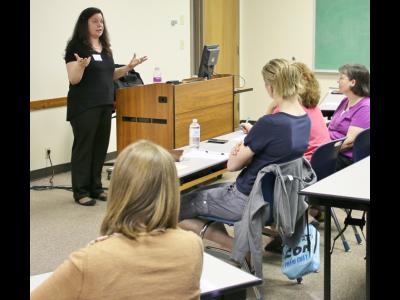CIU Hosts Regional Meeting of the Evangelical Theological Society

Cassandra Frear, a student in the CIU Seminary & School of Ministry, presents her paper at the ETS Southeast regional conference.
By Bob Holmes
Columbia International University hosted the Southeast regional meeting of the Evangelical Theological Society (ETS) in March. ETS is a group of scholars, teachers, pastors, students, and others dedicated to the oral exchange and written expression of theological thought and research.
Dozens of theologians from Christian universities and seminaries were on hand to discuss a number of topics, including plenary sessions on “The Problem of God and Evil” presented by CIU alumnus Dr. Paul Copan, a Christian apologist and philosopher at Palm Beach Atlantic University in Florida.
CIU professors presenting papers at the event were Dr. David G. Cashin and Dr. Matthew D. Haste.
Cashin’s topic was “Knowing God in the Bible and the Qur’an.” He noted that the Qur’an is written in seventh century Arabic, and to substitute any name other than “Allah” in Muslim liturgy would be blasphemy. That makes what can be known of God “frozen in time and space” and “non-contextual and non-experiential.”
“What can be known of him is what was known in the seventh century, and that was purely law,” Cashin said.
In contrast, Cashin said the God of the Bible insists on using the heart language of His followers.
“The revelation is contextual and experiential and the issue of the language is superfluous,” Cashin said. “It is obvious that relational communication will take place in a language which the person understands. This is the reason why the Bible has always been translated and will always be the most translated book on the planet.”
The paper presented by Haste was titled, “Make Your Calling and Vocation Sure: Toward a Puritan Understanding of the Call to Ministry”
Haste says there is confusion over the nature of ministry calling in modern evangelicalism. So he offered the understanding of vocation from the English Puritans with its roots in the Reformation. Haste first noted that The Reformers challenged the medieval assumption that calling only applied to sacred service, but could be applied to all vocations.
“Thus, the Puritans did not elevate one aspect of calling above the rest but rather sought out a confluence of characteristics that demonstrated God’s wise hand of preparation in a person’s life.”
He also notes that they did not mythicize the ministerial vocational process.
“When compared with how many approach this question today, the Puritans can be commended for their emphasis on the objective nature of calling,” Haste said. “They encouraged individuals to consider how God had gifted them, what opportunities lay before them, and, especially, how others responded to them.”
Plus, he says the Puritans emphasized external rather than internal confirmation, asking questions of prospective ministers such as How have you seen others respond? Do you have the blessing of your peers? Do others consider this course wise for you? Has the church affirmed your suitability for the work?
“Each of these considerations forces a man to look outside himself and protects him in some way from self-deception,” Haste said.
Meanwhile, Cassandra Leigh Frear, a student in the CIU Seminary & School of Ministry, offered a paper titled, “A Way For the Pilgrim – Movement Towards Maturity in Hebrews 6:1.”
That text reads:
Therefore leaving the elementary teaching about the Christ, let us press on to maturity, not laying again a foundation of repentance from dead works and of faith toward God,
Delving deeply into the original Greek text, Frear said Hebrews 6:1 is a pivotal verse in the book.
“(The author’s) audience needs to understand the dangers if they turn back from their journey into full faith in Christ and identification with him,” Frear said.
“If pilgrimage is a figurative expression of the author’s purpose in writing the letter, then his purpose is succinctly reflected in 6:1a: the readers must leave their comfortable place in the beginning principles of Christ and move forward towards maturity.”

